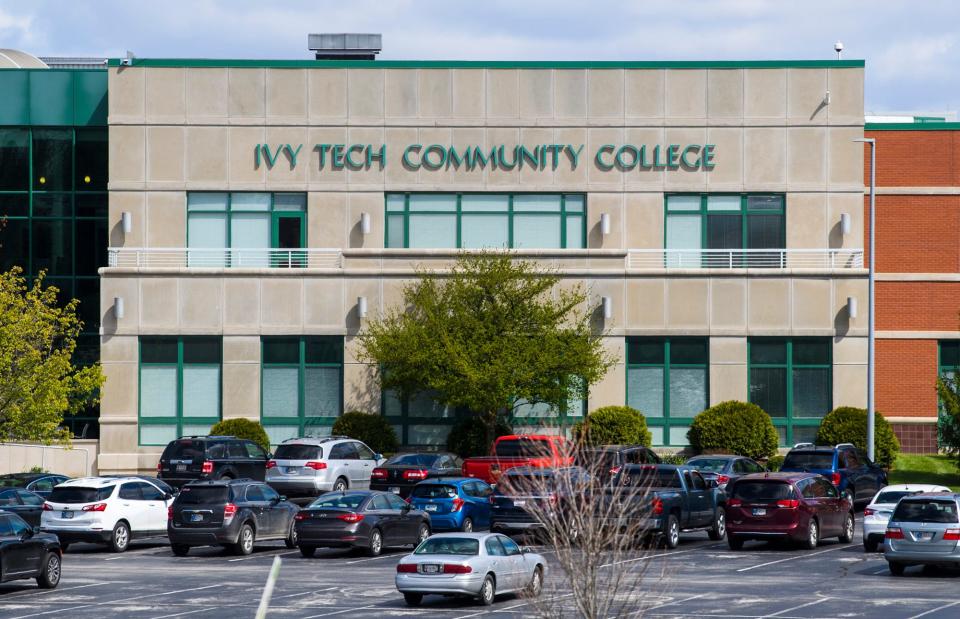Indiana University, Ivy Tech raise tuition, find different way to save students money
College student tuition is set to rise over the next two years in Indiana. Earlier this summer, Indiana University and Ivy Tech Community College, released plans to increase in-state tuition by approximately 3% and 5% respectively.
Despite this increase — one of the most significant hikes for either institution in recent years — both administrations claim most of their students can, in fact, save money in other ways.
State-recommended tuition hike is largest in over a decade. Here's why.
While the trustees of a university or college have ultimate agency over tuition increases, the institutions also receive state-issued guidance from the Commission for Higher Education.
The commission analyzes a series of factors to determine a cap on how much tuition should increase in Indiana. Seth Hinshaw, associate commissioner for finance and operations, is tasked with providing financial, budget and policy analysis regarding higher education finance issues in Indiana. He said it's not a simple formula.
"Really, one of those priorities for the commission is to make sure that we're not just lockstep with inflation growth, but that we're actually, over time, allowing that the cost of education becomes a smaller part of the Hoosier household budget — not a larger part," Hinshaw said. Ultimately, he said, the goal is make sure college tuition takes no more of a household's income than it did the year prior.
This year, the commission recommended a tuition increase of no more than 3.5%. For the academic years 2021-22 and 2022-23, the commission recommended no more than a 1.45% increase.
Many factors are considered in the recommendation, but what's going on in the economy can have a sizeable impact.
"Inflation usually follows cycles. When there's a recession, you'll see significant inflation following it," Hinshaw said, later adding, "The last time the commission recommended a target of 3.5% was following the Great Recession in 2011.”
Inflation also was taken into consideration by the Indiana General Assembly. The largest revenue streams at most higher education institutions are student tuition and fees and state appropriations. For this budget, the Legislature approved operating support increases of 4% and 6% over the next two years, which equates to $130 million of new money for higher education. The state also allocated more than $630 million to capital funding.
"We were really, really pleased to see that during this kind of era of significant inflation, that the state stepped up in a really big way to provide new operating support to them,” Hinshaw said.
Indiana University, Ivy Tech increase tuition for next two years
Typically, at least one or two institutions will state a reason to go above the commission's recommended increase, Hinshaw said.
Ivy Tech Community College's board of trustees approved a tuition increase for 2024 of 5.93% and 4.94% for 2025, citing an internal reshaping of its financial structure.
Between 2021 and 2023, Ivy Tech froze tuition, thanks to support from the General Assembly. COVID-19 pandemic funds allowed Ivy Tech to absorb expenses typically covered by tuition and fees. Those funds are gone, and Ivy Tech is back to relying on tuition dollars.
"Because Ivy Tech is a community college — we don't have (on-campus) housing, we don't have athletics — we don't have a lot of auxiliary funds that some of the four-year institutions have. So we rely more heavily on state support than almost any other college," said Mary Jane Michalak, vice president of legal and public affairs at Ivy Tech. Between 53% and 56% of the college's overall budget comes from the state.
Banded tuition and mandatory fees for 2023-24 will go from $2,318 per semester to $2,455 for 2023-24, and $2,577 for 2024-25.
Michalak said the college is less certain about future state appropriations. The General Assembly altered its model of higher education appropriations, leaving Ivy Tech administrators in the dark about how much funding they will receive this budget cycle.
"We don't know how much of that money we will get over the next two years. That is different than in past years," Michalak said. "With this budget, it's a question mark."
The state is now using a new funding model for public colleges and universities, which means Ivy Tech no longer can count on a specified, predictable amount. Despite a historic investment from the General Assembly, it isn't a guarantee Ivy Tech will have more money.
"While it is true that there was a historic dollar amount, our expenses are also going up," Michalak said.
IU also listed expenses as reasoning for its 3% tuition increase for all campuses. Tuition at IU Bloomington is increasing by $343 for the 2023-24 academic year.
An IU news release stated the increase will support faculty recruitment and retention while addressing increases in expenses for labor, services and other fixed costs.
In its recent report, the Commission for Higher Education listed staff salaries as "the greatest expense for colleges and universities, making up roughly 75% of total expenditures. In the competitive market of staffing highly educated individuals, salaries can be a high driver of cost increases at institutions.”
IU employees' wages could increase as much as 3% this year, a big compensation hike for the university. Over the past five years, salary and wage increases at IU have averaged 1.5%, with no university-wide salary increase in 2020-21 due to the pandemic.
"We operate in a space that, again, is hyper competitive, and we want to recruit the best talent, and we also want to retain the best talent," Dwayne Pinkney, executive vice president for finance and administration at IU, said.
While both colleges raised tuition, each also has taken steps to restructure other student costs, such as fees and textbooks.

IU Tuition Task Force downsizes student fees
Last year, IU President Pamela Whitten assembled an Academic Tuition and Fees Task Force. The committee, led by Pinkney, was tasked with making tuition rates more transparent and finding ways to minimize overall costs of attendance.
Committee members looked at each fee, reducing some and eliminating others.
Three fees — distance education, late registration and late schedule change — were eliminated on all campuses. At IU Bloomington, those three fees amounted to about $100 per student. No new fees were added.
IU also reworked how course-related fees show up on a student's bill.
Fees tied to specific coursework and classes can make it harder to predict how much a semester will cost. Pinkney said IU is addressing this by integrating course fees into the program, distributing costs more evenly over time.
There are exceptions. Certain programs, such as some offered at the Kelley School of Business or the Luddy School of Informatics, Computing, and Engineering, may not see a big impact thanks to the higher cost of a course's delivery and production, such as faculty salaries.
The IU administration anticipates the student body as a whole will save $14.5 million a year beginning in 2024.

Ivy Tech Community College caps textbook prices for students
Ivy Tech estimates, even with tuition increases, two-thirds of students will see a decrease in overall costs due to fee and textbook reform.
A $75 per semester mandatory technology fee and a $20 per credit hour distance education fee are now incorporated into tuition. According to Michalak, this promotes more transparency and makes things more equitable for part-time students.
"If a student was enrolled in one course, they paid $75 per semester. If they were enrolled in five courses, they were charged $75 a semester. Looking at that, we felt like that was overcharging students who are taking fewer classes. Two-thirds of our students are part-time, and so it's like, 'How do we reduce costs for students overall?' and understanding when students get their bill, they don't want all these local hidden fees," Michalak said.
In 2019, a report from the Public Interest Research Group showed 63% of students across the U.S. skipped buying a textbook because of the cost. In 2022, a survey by the National Association of College Stores found one in four students did not obtain at least one of their course materials because of the cost.
Textbooks can cost between $200 and $1,400 per year. Ivy Tech students will now pay $17 per-credit hour for all textbooks during the 2023-24 academic year. That will go down to $16.50 for 2024-25.
"We recognize that textbooks are a huge cost, and that students don't know how much they're going to pay in textbooks year to year. A lot of it depends on the classes that they enroll in and the programs that they're in," Michalak said.
During the COVID-19 pandemic, relief funds allowed Ivy Tech to provide free textbooks. After the funds ran out, Ivy Tech used its buying power to negotiate a lower price from its textbook provider, Barnes and Noble, Michalak said.
The textbook fee is optional. Students who don't want textbooks can opt out.
The initiative is expected to save Ivy Tech students more than $17 million annually in textbook costs.
Reach Rachel Smith at rksmith@heraldt.com.
This article originally appeared on The Herald-Times: Indiana University, Ivy Tech raise tuition, reduce fees for 2024

